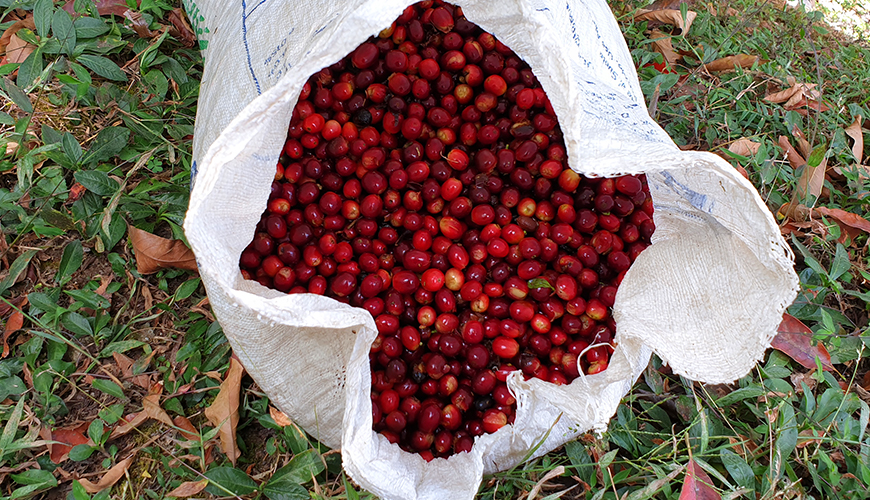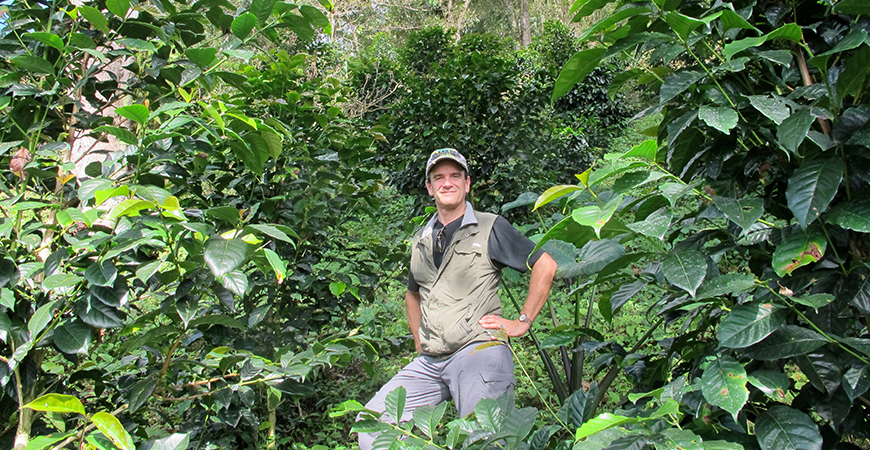- Free shipping in NL from €45
- Order before 12 PM, shipped same business day
- International shipping

Gesha or Geisha? The origins of an iconic coffee variety

For 20 years, Gesha has been one of the most sought-after coffees in the world. In Panama, the Gesha news struck like lightning, and this variety has been highly favored ever since. She receives record-breaking bids at coffee auctions and is a prize winner with great regularity. Panama was already becoming well-known in the world of quality coffee. When Geisha coffee was discovered in 2004 and successfully grown and sold at high prices by more Panamanian farmers, Panama was finally recognized as a quality coffee country. The origin of this coffee is in Ethiopia, in the Gesha region, where this particular variety still grows.
According to the International Trade Centre Coffee Guide, Gesha is an Ethiopian landrace variety. In agricultural terms, this means that it developed naturally in a specific local environment over many generations - most likely without any human intervention. In the 1930s, researchers collected seedlings and seeds from Ethiopia and sent them to Kenya and Tanzania, where the variety was first registered as "Geisha." In the 1950s, the UN Food and Agriculture Organization (FAO) sent some of the seedlings to the Tropical Agricultural Research and Higher Education Center (CATIE) in Costa Rica. Through this route, the species eventually ended up in Boquete, Panama, on several farms.
Willem Boot on his Gesha plantation.
One of these farms was Hacienda La Esmeralda - the same farm that in 2004 produced the Best of Panama-winning coffee that first sparked such great interest in Gesha. Dié Esmeralda Geisha was bought by BOOT Coffee as the first great Geisha coffee, also because Willem Boot was very closely associated with it. It was Willem Boot who scored the coffee with 96 points, and with a maximum of 100 points, that is very high. This success was the go-ahead for him to start his own Gesha plantation, under the name La Mula. Ten years later, Willem's Gesha won the Best of Panama in the Gesha category.
The success has continued unabated since 2004. Gesha has become not just a variety, but a household name. The coffee is bred to retain the desired genetic traits - mainly its fantastic flavor profile.
So what is so special about it?
The body is often tea-like and you taste complex, fruity, layered and floral flavors such as citrus and flowers. Region, climate, terroir and processing method influence the final profile. Gesha is unique in that complex profile; they often score at least 88 points on the Specialty Coffee Association's 100-point scale.
Coffee farmer Adriana Beltran now produces a beautiful, Skal-certified organic Geisha coffee on her plantation in Colombia. The Colombia La Laguna Geisha Organic - Limited Edition is now available at BOOT.
Colombia La Laguna Geisha Organic - Limited Edition
Panama Kotowa Duncan - Lot 1873 - T2 - Filter - Limited Edition
Liqueur, forest fruit, cocoa & tropical fruit
Colombia La Laguna Geisha Organic Kachalu Espresso - Limited Edition
Elderflower, peach, citrus & chocolate.
Colombia La Laguna Geisha Organic Kachalu Filter - Limited Edition
Elderflower, peach, citrus & chocolate.
-
Horecava - Jan. 13 to 16 - RAI Amsterdam Jan 9, 2025
-
Cold autumn days, warm up with good coffee Nov 13, 2024
-
Vacancy Trainer Workshops Nov 12, 2024
- horecava
- 2025
- boat
- coffee
- state
- hospitality
- entrepreneur
- Specialty Coffee Association
- SCA
- Coffee Concepts
- arabica
- quality
- flavor
- autumn
- intense
- java
- indonesia
- espresso
- warm tastes
- coffee experience
- speculoos show
- coffee autumn
- specialty coffee
- coffee moment
- coffee enjoyment
- artisanal coffee
- coffee inspiration
- boat coffee
- barista trainer
- coffee professional
- give workshops
- latte art
- coffee tasting
- Boot Koffie
- Amersfoort
- sustainable coffee
- hospitality support
- passion for coffee
- geisha
- gesha
- coffee type
- ethiopia
- panama
- colombia
- willemboot
- famous
- Ethiopian coffee
- panamanian coffee
- gesha origin
- coffee auctions
- hacienda la esmeralda
- quality coffee
- coffee designation
- Colombia La Laguna Geisha Organic - Limited Edition
- live
- roasting
- samples
- tasting
- burn
- cupping
- baarn
- store
- barista
- limited
- amersfoort
- local
- the classroom
- birdsong
- hartmann
- October
- araceli
- coffee of the month
- flat white
- brazil
- brazilian
- fazenda
- sao
- francisco
- bela
- vista
- coffee journey
- rick
- buyer
- drought
- price
- win
- jura
- stanley
- ktc
- happiness
- win
- espresso machine
- winners
- won
- discount
- organic
- filter
- pezzetti
- espresso jug
- filter coffee
- aeropress
- processing
- processing methods
- unwashed
- natural
- sustainable
- washed taste tones
- semi-washed
- washed
- honey
- processed
- blog
- kachalu
- decaf
- decaffeinated
- coffee farmer
- recepet
- instructions
- alejandro
- stable press
- team
- trainer
- business
- edition
- mesh
- premium
- caturra
- maragogype
- sumatra
- kopepi ketiara medan
- fair trade coffee sumatra
- organic coffee
- ketiara coffee cooperative
- hutan project sumatra
- sustainable coffee production
- esther
- indonesia
- blawan
- jampit
- shopping
- especially
- trial day
- organic
- home barista
- happinessflavor
- barend
- barendboot
- owner
- bio
- demonstration
- summer
- 84+
- grinding degree
- iced coffee
- panamaria
- koyner
- bunnik
- field kitchen
- food
- drink
- location
- bakery
- vegetable garden
- harvest table
- eko
- blend
- full body
- guts
- municipality
- ondernemen
- durable
- markroell
- mayor
- eemland
- nmvh
- dutch
- society
- industry
- trade
- Espresso
- Filter
- Panama
- coffee plantation
- acf
- amsterdam
- coffee
- festival
- acf2023
- event
- stock exchange
- gas plant
- westgas
- brazil
- coffee grinder
- ratio
- lead time
- month
- santos
- brasil
- times
- vincent
- van dijk
- representative
- resale
- stores
- ricardo
- boquete
- panamese coffee
- rickmaas
- kotowa
- grow
- dry
- select
- trip
- cooperativa
- caficultores
- santander
- rainforrest
- alliance
- tuyettran
- togo
- cups
- wecup
- waste
- litter-free
- re-use
- throwdown
- latte
- art
- milking
- February
- darja
- sexton
- director
- ethiopia
- odin
- organic
- magazine
- interview
- sommelier
- origin
- personal
- exotic
- taste profiles
- experience
- story
- Flavors
- trendy
- trends
- coffee trends
- green
- begin
- 2024
- coffee-of-the-month
- pacamara
- yeast
- yeast
- fermentation
- donjuan
- juan
- fermentation method
- agronomic
- family
- plantation
- administration
- webshop
- lungo
- Indonesia
- Sumatra
- Intense
- Women
- 50
- year
- reunion
- reunion
- the golden coffee box
- employees
- sinterklaas
- December
- piet
- poem
- ode
- spicy
- highly recommended
- nose
- burners
- roastery
- cupping
- perfection
- specialty
- finquita
- shiva
- not
- coffee roaster
- burner
- professional
- manager
- warehouse
- roast
- pro
- skal
- darkroast
- mystery
- smoky
- arnout
- decaffeinated
- quick
- quickmill
- machine day
- machine
- 820
- put
- employee
- store manager
- joukevink
- jouke
- finch
- lovebebber
- passion
- craft
- 50 years
- anniversary
- party
- coffee shop
- action
- quick mill
- hello
- dennis
- from
- will
- events
- account manager
- sales
- sales division
- office
- true
- brazil
- exciting
- travel
- lennard
- woerig
- elwaydesigns
- webdesign
- marketing
- designer
- enthusiast
- boat coffee game
- winner
- specialtycoffee
- Ethiopia
- AeroPress
- Hand Mill
- Outdoor Living
- Filter Coffee
- koffievdmonth
- coffees
- change
- coffee price
- increase
- Fair
- CO2
- costs
- radio
- m
- utrecht
- momoto
- wine
- whiskey
- litchi
- show
- dekoffeeshow
- music
- stories
- experienced
- vocals
- tell
- corazon
- dirkjan
- article
- gooieemlander
- present
- past
- future
- duration case
- goldencoffeebox
- avenue street
- baarnschecourant
- misset
- restaurant
- catering kitchen
- serve coffee
- cooking and cooking techniques
- boat coffee
- capriole
- chocolate
- coffee roasting
- move
- coffee production
- Brazil
- Mantiqueira de Minas
- quantity
- Brazil Santos
- Boat
- top
- two
- coffee dinner
- theLocal
- café
- denhaag
- capsules
- cups
- nespresso
- cup
- nice
- enjoy
- coffee brewing
- ultra
- heirlloom
- panama birdsong
- coffee bushes
- rainforest
- finca hartmann
- best of panama
- misset catering price
- recipe
- cereal drink
- coffee capsules
- coffee substitute
- deforestation
- climate neutral
- caffeine
- decaf
- natural
- certified
- tamp
- baristas
- profession
- box
- master
- moccamaster
- coffee game
- announcement
- filter machine
- tableware
- filters
- cafe
- dirk-jan
- leather
- bestofpanama
- ratibor
- tessie
- winner
- price
- award
- taste
- CSR
- futureproof
- collective
- rainforest
- discount
- action
- actions
- actions
- bonus
- affordable
- prices
- sunshine
- tastiest
- most beautiful
- mexico
- AMS
- climate
- neutral
- press release
- emissions
- carbon
- footprint
- environmental impact
- climate impact
- CO2
- acf2022
- cabra
- yemen
- gourmet
- corona
- conditions
- web store
- order
- Buy
- covid19
- Opened
- changes
- coffee farmers
- price increase
- fairtrade
- amsterdome
- theather
- dragan
- bakema
- draganbakema
- nk blind tests
- soesterberg
- fanciers
- sommeliers
- Kontakt der Kontinenten
- fred nijhuis
- cooperative
- discovered
- kaldi
- legends
- fruits
- monks
- mocha
- qahwa
- coffee shops
- July
- harvest
- new
- organic
- soccer
- uk
- elf
- cold drip
- ride
- bicycle tour
- bunschoten
- scuderia
- lamarzocco
- marzocco
- coffee bean
- life
- sustainability
- coffee grounds
- scrub
- compost
- hands
- her
- skin
- odors
- recycle
- entrepreneurs
- actor
- coffee happiness
- sponsor
- sponsorship
- convenience
- tips
- brewing tips
- milk
- foaming
- Froth
- latte-art
- home
- video
- beginner
- hearts
- flowers
- advanced
- cafetiere
- push pot
- frenchpress
- slowcoffee
- grinding
- brewing instructions
- save
- coffee storage
- how long
- organic coffee
- store brewed coffee
- panamanian
- single estate
- happiness by taste
- trialand-er
- maria
- ruiz
- michiel
- slaats
- coffee song
- smell the bush
- test different
- piano
- trumpet
- milk frother
- Brazil
- Nicaragua
- Ethiopia
- espresso coffee
- pananama
- Tea types
- cocoa
- ktc35
- coffee for peace
- epsresso
- cold
- brew
- coldbrew
- ice
- beverage
- serving tip
- cocktail
- espressions
- work
- manual-filter-coffee-making
- sachets
- ese
- serving
- pads
- fantastic
- fiter
- make the best coffee
- Workshops
- tastings
- temperature
- amount
- warming up
- Amsterdam Coffee Festival
- Is coffee healthy
- is coffee good for you
- how healthy is coffee
- how many cups of coffee per day
- is decaffeinated coffee healthier
- is filter coffee healthier than espresso
- beans
- coffee countries
- countries
- healthy
- cafetière
- scoops
- healthier
- support
- local
- coffeetogo
- the price ofmycoffee
- book
- fair price
- fair coffee
- mission
- acf2020
- socialimpact
- percolator
- coffee cup
- coffee pod
- piston
- sustainablecoffee
- what's the money in coffee
- sustainablecoffee
- did you know
- whatyouneed to know aboutcoffee
- crowdaboutnow
- crowdfunding
- threatened
- low
- revenue
- wedding
- prizewinner
- missethoreca
- finca
- coffee cocoa
- hotspot
- coffee room
- vegan
- conscious
- delights
- smoothies
- acai
- heleenvanroyen
- heleen
- royen
- coffee diary
- coffee school
- hilversum
- plant
- berries
- coffee plant
- harvest
- launch
- coffee orders
- buy coffee beans
- npo3
- inspection service
- inspection of value
- marin frank
- barend boot
- July 11
- TV
- broadcast
- visit
- prideofthailand
- thailand
- thai
- coffee prices
- costa rica
- guatemala
- el Salvador
- honduras
- nicaragua
- fair trade
- middle america
- south america
- conversation
- nk
- blind tests
- fd









